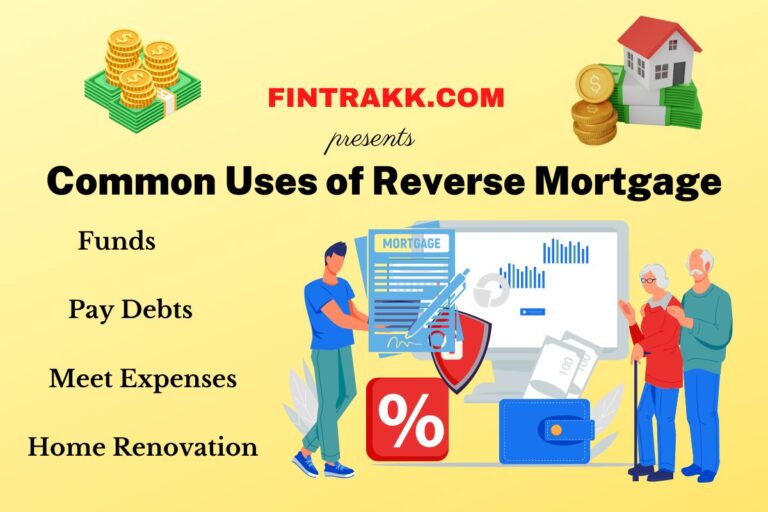Reverse mortgages are a unique financial tool designed to enable those aged 62 or over to tap some of their home equity for cash. Unlike traditional loans where monthly payments go directly to lenders, with reverse mortgages the lender pays the homeowner instead.
Reverse mortgages provide older adults with an easy way to tap into the value of their home equity without selling or moving, which may prove particularly helpful as retirees look for additional income to support their lifestyle or cover unexpected expenses.
Recent years have witnessed an upsurge in reverse mortgage usage among seniors. It is projected to grow at an estimated compound annual growth rate of 15% between 2021-2026; when used properly, reverse mortgages can serve as powerful financial planning tools.
No matter whether you are considering taking out a reverse mortgage yourself or simply wish to gain more knowledge on this financial option, read on as we explain its common uses.
No one wants to spend their retirement years burdened by debt payments and worrying about repayments. Retirement should be a time for relaxation, enjoyment, and financial security – taking out a reverse mortgage loan can help homeowners pay off debt faster!
Reverse mortgages provide homeowners aged 62 or over with an effective means to turn some of their home equity into cash that can help pay off outstanding debts such as high-interest credit card debt, medical bills or any other financial obligations that might be hindering them financially. By tapping into their home’s value for debt relief purposes, borrowers can free themselves of high-interest credit card debt, medical bills or any other financial commitments that have become burdensome over time.
Do Enjoy Reading Top 10 Best TradingView Alternatives 2024
A key advantage of using a reverse mortgage to repay debt is its flexible repayment terms compared to traditional loans; unlike them, reverse mortgages do not require monthly payments and instead will be repaid when either selling their property, moving, or passing away; giving individuals more time and freedom to manage their financial situations without being burdened with payment obligations each month.
Home Renovation and Improvement Financing If you’re a homeowner searching for funding to fund home improvements and renovations, reverse mortgages could be a viable option worth considering. By accessing their equity they have built up in their home over time instead of paying monthly mortgage payments they could receive funds directly from it instead.
Homeowners can utilize reverse mortgage funds for home renovation projects such as remodeling a kitchen or bathroom, adding an extension, or just making essential repairs without breaking their savings or incurring more debt. Reverse mortgages provide homeowners with flexible financing solutions to enhance living spaces while increasing property values without tapping savings or incurring new debt.
Reverse mortgages allow borrowers to enjoy renovated and improved homes without worrying about immediate repayment obligations. They provide homeowners with peace of mind.
Reverse Mortgages Can Offset Healthcare Costs
Reverse mortgages are an invaluable tool in offsetting healthcare costs for seniors. As medical expenses continue to soar, older adults often find themselves burdened by mounting medical bills with limited income – reverse mortgages provide an effective means for converting some of their home equity into tax-free cash.
Do Enjoy Reading Maximizing Your Tax Season: Pros & Cons of Refund Loans
Reverse mortgages allow seniors to access funds that will cover medical expenses like hospital stays, prescription medications, doctor visits and long-term care services without compromising quality of life. They offer financial flexibility while meeting healthcare needs without compromising quality of life.
Raising Funds for a Second Home
Reverse mortgage loans can provide funds that you can use as down payments on another house purchase. They allow you to borrow money against yourself without ever needing a conventional bank loan in this way.
You have several options available to you when looking to downsize into a smaller house. One is selling off your current property and using some of your equity as down payment and taking out a reverse mortgage loan on it; in order to use another is using this strategy on another smaller property and receiving reverse mortgage loan approval on it.
Explore Best Online Stock Brokers in USA as well.
Reverse Mortgages Can Reduce Taxable Income
Reverse mortgages provide homeowners looking to minimize their taxable income with an effective means to do so. By tapping the equity in their homes as collateral for accessing funds without creating more taxable income. This strategy may prove particularly useful for retirees or those on fixed incomes looking for ways to reduce their tax bill.
One of its primary advantages is providing homeowners with non-taxable payments or disbursements that they can use to cover expenses, pay debts off, or invest without increasing their annual tax bill.
Reverse mortgages offer retirement residents many financial advantages, from financing home improvements to paying off debts.






+ There are no comments
Add yours